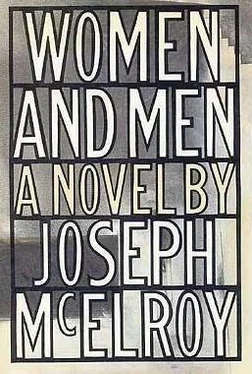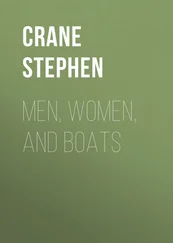The room’s silent, your mouth dry as a drunk’s, knowing less than nothing more than that the brass circle-with-a-collar in which each chair leg sits or stands is what they screw down ship’s furniture with — you too when you look back on that after all quite fun crossing it’s so to the life it is a very picture, painting not the town but the ocean red and the thirty-knot floating town blue and white on the outside, and wet on the inside, color no problem, it’s still done to the life (before air fares much less matter-scrambler beamings got prohibitively cheap); and the power vacuum a daughter found for father out in the hinterlands that stayed with her into later life is more of this insidious finding two or more questions for only one answer; ditto the sons of the mother who sent them away but seemed herself the one who’d left, those two sons (one who went and one who stayed put) who were secretly if we remember one as well as two, does that mean they two were one or that one of them was two, the one son sent away where he belonged to be human? the inquisitor wants to know, our hands are connected to the arms of the chair, the man conducting the interrogation can’t wait, his time is worth its while, O.K., he’s said, which is it? The earphones with hard-to-beat frequencies are almost upon us while the wire for the earphones uncoils by itself, the man says he’s going to offer us some encouragement, some inducement to decide which of two things we mean. (Wide Load!)
Did we lie, then, speaking doubly?
There in our inquisitor’s eyes are shades of our danger which maybe he shares by knowing what is going to happen to us here no matter what we say maybe, or in the other room which now that we’re here becomes what this room once was, namely the next room, hear the silence, you could cut it with an electric prod, and you should; hear within the silence a high-frequency tuner rising in pitch or volume you can’t tell maybe both.
Just talk straight, honey, said Grace Kimball again and again, late in her century, tell it like Mama didn’t teach you; go public, come out (you know? — spelled TV O) be up front, like the money, everything else is guilt and manipulation.
James Mayn on another track thirty seconds away by phone, two three four five hours by air, said, Include me out of this Discussion of the Void and what is supposed to fill it; look if they get me under the lightbulb how do I know what I might say, I’m not one of your great talkers but under that kind of interrogation I might become human, I mean I might elect to survive, I’ll do what I have to do if I’m lucky, I might even make up what I’m supposed to know, I might get inspired, I’m human I don’t know how I’m going to react, I’ll say this, maybe I don’t even know my sources to divulge, maybe I can’t say what I saw or what someone said, but I would go easy on the jokes, I think, because those guys who do the interrogating have a sense of humor to begin with but on another wavelength which when it hits my skin-ends could just get into my wavelength or is it width, overloaded width? ouch, I’ll keep myself going maybe by thinking, What if I had this guy interrogating me alone man to man in a shopping-center parking lot, no secret weapons, nothing fancy, equals you know, just a couple of temporarily missing persons settling a difference.
Yeah, yeah, that’s how men settle their differences, a female voice on two firm thighs is piped in.
You mean how man, growls a male voice on two suspect knees.
A child is heard observing to a fellow child, See I had this block that was chipped, my dad threw it against the wall, there’s where it hit, he got a long-distance call from my mom, and he came back and we were working on this launch pad and suddenly he picked up this block and threw it, you see where it got chipped?
Breathe, said several people softly in unison and it was a comforting command.
In those days there were breathing problems they were called. We’ve cleared all that up by now, looking back, and that’s a promise. But in those days, from the city citizen in one’s high-rise apartment caught between the sounds of the sky and the sounds of the street, to the grand diva singing her guts out for the cheaper seats up in the troposphere interface as much as for those in the dress circle and closer in in seats so inflated they were out of sight, there were popular misconstruings as to the future evolution of our equipment, for instance what song we would be singing fifty years later. We’ve said "future" to be clear, for according to our historians picking up after our anthropologists, the past is also evolving, as the old song ("My Dreams Are Getting Better") had it, "all the time."
Looking back we found that we too had gone in for human sacrifices. To get where we were, we’d made them, and included others among us.
We have been busy. We have worked on it and some have become in fact busy bisons. But dispersed along our respiration’s warp that gets us together and expels us, flows us and stammers us, We have worked on our collective awareness of, as the poet says, similarity between us, which is liking, and difference between us, which is loving, in order as a long-range project to become single.
***
Yet inside this noise a silver needle is heard over its compass rose still in its package vibrating less Obstacle Race than Obstacle Hunt. It’s what I’m getting — O.K., what we are getting — as an imprint through glass, cardboard, paper, and skin from the wildly jiggering compass needle. Obstacle Quest it sounds like. For you can’t get around the ob. until you locate it through what gaps between.
Like what a father didn’t say or a mother didn’t do. Gaps where somebody wasn’t. So we took up position there, O.K.
But fell through.
That’s the horizon for you.
More to it than our mother and our father, who can’t take all the blame for the fix we’re in and who now turn out to have been obstacles inspired by our trying to get through to what we’ve chosen to forget may not be there.
Except as a wind that takes you where wants go. To the next obstacle. If it doesn’t pass you by. That you go past, then, to see it back there as if it was, my word, "the limit," that’s what a fantastic grandmother called a snoring grandfather in his and her sleep, "you are the limit!" whom she probably would sometimes dream of punishing for dropping cigar ash in his pleasant bed-dreams on such carpets as connected in later years their separated bedrooms, Persian carpets almost meeting in an L-shape, whose angle is both the gap between them and the threshold into which we turn to see the other.
Who has. . what? disappeared?
Not quite.
Is it the Buddhist monk, who as he burns away even this last desire to burn so seems to spin, as a creed enjoins? As ye reap thus shall ye sow, the western observer of this event quick-quote-reports on tape, and she is a beautiful, dusty little woman in a Stetson hat, and her cam’raman and his gear have disappeared, and she reports on tape the crystallized advice of this dying Buddhist burning with purpose. No microwave oven he, no Sugar Crisp bargain fed to the air which knows he can’t be totally consumed, a piece of him will survive the fire’s fuel, there’s a fossil shortage. Also his economic teachings will survive him, if we remember. They’re on tape don’t forget; some anyway, if we recall.
Later the muddy-faced dramatic little woman’s voice is joined by her body Stateside. She’s draped now in one simple length of uncut, unsewn saffron matter illustrating a principle of economics that other women at Grace Kimball’s loosely structured Body-Self Workshop who know this correspondent-woman’s reputation expect to be but a preface to history when this small, beautiful, now clean woman removes the garment that represents a maximum of well-being and a minimum of labor and consumption, but instead, there, then, she is, naked, "lovely" (somebody says) and not at all the confident person thousands of miles away graveling on magnetic tape the burning monk’s economic doctrines of full employment for its own sake and purification of character as opposed to multiplying goods and wants.
Читать дальше












